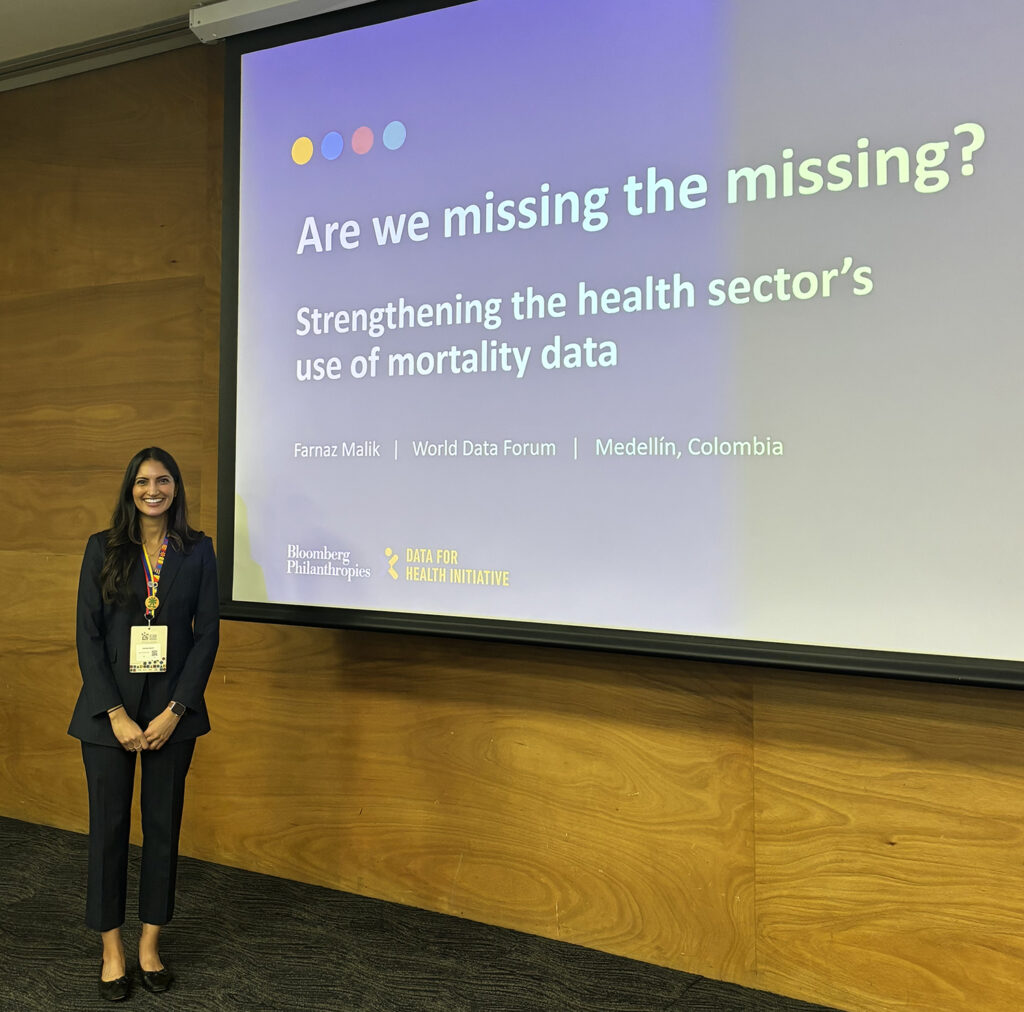In November, members of Vital Strategies’ team as part of the Bloomberg Philanthropies Data for Health Initiative traveled to Medellín, Colombia to present their expertise at the United Nations World Data Forum, a global gathering of nearly 3,000 participants from around the world dedicated to harnessing data to advance sustainable development. Our team highlighted the transformative role of data in public health policy, sharing success stories from our partner countries, including China and Peru. These stories demonstrated how data on births and deaths has been crucial in shaping life-saving interventions, offering real-world examples of how data can drive meaningful change in public health outcomes worldwide.
How Cause-of-Death Data Can Save Lives

Members of Vital Strategies’ Data Impact team presented on the extraordinary progress that can be made when policymakers leverage their routine health data for evidence-based decision-making. Farnaz Malik, Senior Technical Advisor, gave a lightning talk on how death data can be used to save lives. Don’t have 10 minutes? Watch her 15-second takeaway.
Sharing Data Impact Program Success Stories

Emily Myers, Senior Technical Advisor, led a panel on what it really takes for policy organizations to integrate data use—essentially providing a high-level overview of how the Data Impact program works. The panel also featured Vital’s Julieta Lomelín-Gascón, Technical Advisor, and Farnaz Malik, Senior Technical Advisor, who spoke about two pillars of the Data Impact program: data-centered leadership and communication capacity development. Data-centered leadership empowers public health managers to identify and implement data use improvement projects. The communication programs target public health officials and journalists to emphasize the power of storytelling in generating issue awareness and support for health policies. Both initiatives build momentum within the data-to-policy pipeline. Vital’s government partners provided insight from their roles within government and shared country examples of success stories: Ayub Manya, Director of Digital Health, Policy and Research at Kenya’s Ministry of Health; Carlos Castañeda Orjuela, the Director of the National Health Observatory at Colombia’s National Health Institute; and Lester Tan, Director of the Health Policy Development and Planning Bureau at the Philippines Department of Health.
Using Data to Prevent Childhood Stunting
One of Vital Strategies’ former Data for Health Initiative Global Grants Program partners, Juan Carlos Palacios Mora from the Secretaría Técnica Ecuador Crece Sin Desnutrición Infantil, presented on how they’re using data to help prevent childhood malnutrition and stunting in Ecuador. Palacios Mora described the Global Grants Program’s early investment as “paramount” for their success today. “A whole new world opened after we began integrating data,” he said.
Harnessing Partnerships

Adrienne Pizatella, member of the Bloomberg Philanthropies Public Health team, spoke at the conference’s final plenary session on the power of partnerships in realizing transformational change. Pizatella also shared a message from founder and former NYC mayor Mike Bloomberg on the Data for Health Initiative’s continued commitment to data: “When people have good information, they can make good decisions. If governments don’t know what’s making people sick, then they can’t implement the policies needed to address the root causes.”
Success Stories from Colombia
The World Data Forum, co-hosted by Colombia’s National Administrative Department of Statistics (DANE), put a spotlight on the country’s status as a formidable model of strong civil registrations and vital statistics systems (CRVS). Read our Q&A with DANE’s Director General, Dr. Piedad Urdinola, to dig deeper into how Colombia has innovated an inclusive approach to counting everyone in their public health measurements and using the data to inform public health decision-making. And for a birds-eye view of what has made Colombia so successful, read our case study on how Colombia has achieved high-impact, sustainable improvements to their CRVS system.
In addition to spotlighting Colombia’s great success with strengthening its CRVS system, the forum was also a wonderful opportunity to strengthen existing partnerships, forge new ones, and come together to #CommitToData. Don’t miss our recap reel.
About the Data for Health Initiative
Today, approximately half of all deaths in the world go unrecorded; accordingly, health policy decisions are often based on inadequate information. Data for Health, funded by Bloomberg Philanthropies and the Gates Foundation, partners with low- and middle-income countries to improve public health data and use of data for policymaking.